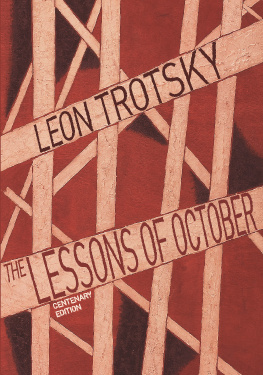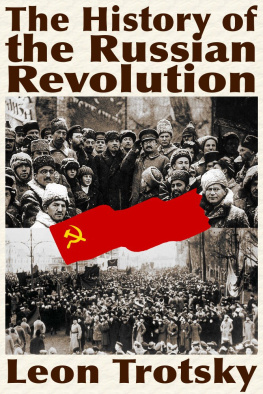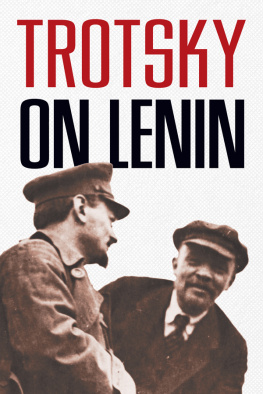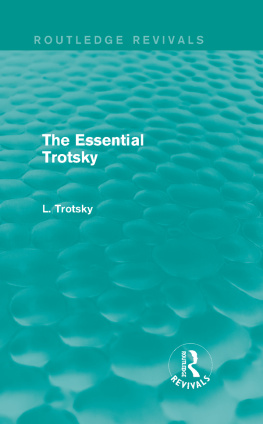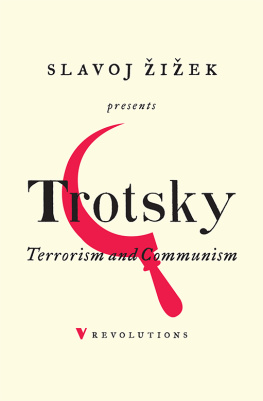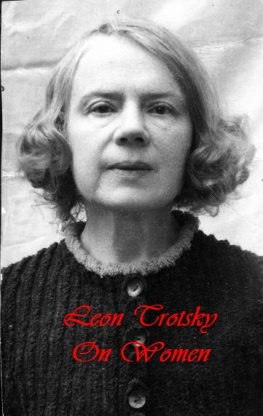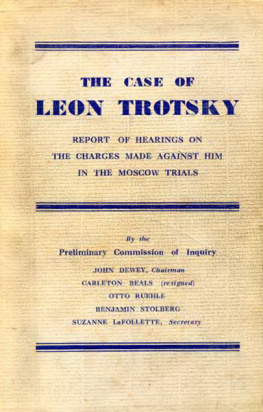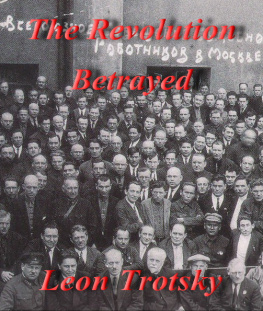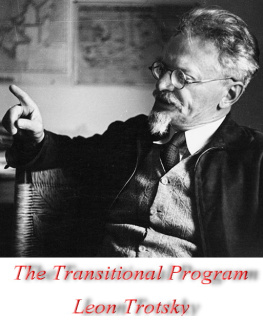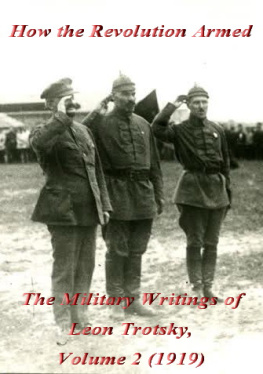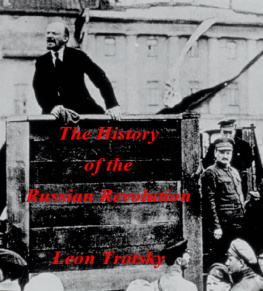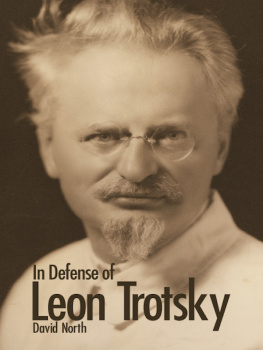Leon Trotsky - Lessons of October
Here you can read online Leon Trotsky - Lessons of October full text of the book (entire story) in english for free. Download pdf and epub, get meaning, cover and reviews about this ebook. year: 2017, publisher: Haymarket Books, genre: Politics. Description of the work, (preface) as well as reviews are available. Best literature library LitArk.com created for fans of good reading and offers a wide selection of genres:
Romance novel
Science fiction
Adventure
Detective
Science
History
Home and family
Prose
Art
Politics
Computer
Non-fiction
Religion
Business
Children
Humor
Choose a favorite category and find really read worthwhile books. Enjoy immersion in the world of imagination, feel the emotions of the characters or learn something new for yourself, make an fascinating discovery.
- Book:Lessons of October
- Author:
- Publisher:Haymarket Books
- Genre:
- Year:2017
- Rating:5 / 5
- Favourites:Add to favourites
- Your mark:
- 100
- 1
- 2
- 3
- 4
- 5
Lessons of October: summary, description and annotation
We offer to read an annotation, description, summary or preface (depends on what the author of the book "Lessons of October" wrote himself). If you haven't found the necessary information about the book — write in the comments, we will try to find it.
Lessons of October — read online for free the complete book (whole text) full work
Below is the text of the book, divided by pages. System saving the place of the last page read, allows you to conveniently read the book "Lessons of October" online for free, without having to search again every time where you left off. Put a bookmark, and you can go to the page where you finished reading at any time.
Font size:
Interval:
Bookmark:
2017 Mary Ellen OBoyle Vanzler
First published in Russian in 1924; translated into English 1925.
Previously published in 1987 by Bookmarks.
This edition published in 2017 by
Haymarket Books
P.O. Box 180165
Chicago, IL 60618
773-583-7884
www.haymarketbooks.org
info@haymarketbooks.org
ISBN: 978-1-60846-754-9
Trade distribution:
In the US, Consortium Book Sales and Distribution, www.cbsd.com
In Canada, Publishers Group Canada, www.pgcbooks.ca
In the UK, Turnaround Publisher Services, www.turnaround-uk.com
All other countries, Publishers Group Worldwide, www.pgw.com
This book was published with the generous support
of Lannan Foundation and Wallace Action Fund.
Cover and text design by Eric Kerl.
Cover art: Space Force Construction , by Liubov Popova, 1921.
Library of Congress Cataloging-in-Publication data is available.
Contents
5The July Days, the Kornilov episode, the Democratic
Conference and the Pre-parliament
Leon Trotsky (18791940) was chairman of the Military Revolutionary Committee which planned and carried out the insurrection of October 1917 in Petrograd. As a leading member of the Bolshevik Party and the Petrograd Soviet, he took part in all the debates about the revolution both before and after October. After the death of Lenin in 1924 Trotsky was leader of the Left Opposition. He was forced into exile from Russia by Stalin in 1929 and assassinated in Mexico in 1940 by one of Stalins agents.
The Lessons of October first appeared as the preface to a collection of Trotskys speeches and writings during the year 1917 which was published in autumn 1924 by the Russian state publishing house. It appeared in English the following year.
Duncan Hallas (19252002) was a member of the Socialist Workers Party in Britain. He is the author of Trotskys Marxism (Bookmarks 1979) and The Comintern (Bookmarks 1985).
Introduction
Duncan Hallas
leon trotsky wrote The Lessons of October in September 1924 as a preface to the third volume of his Collected Works , a volume of his writings from the year 1917 which was never translated into English. The preface was in fact published separately, before the appearance of the book, in late October 1924. According to the historian E H Carr: ... the edition of 5,000 copies was quickly sold out and, when the discussion was at its height, was virtually unobtainable; this led to rumours that it was officially banned.
Discussion is hardly the word. The reaction in the ussr to this short booklet was a storm of polemic, scholastic quibbling, vulgar abuse and down-right falsification. Throughout the autumn and winter, wrote Isaac Deutscher, the countrys political life was entirely overshadowed by this controversy, which has entered the Bolshevik annals under the odd name of the literary debate. Although most forms of soviet and party democracy still remained in 1924, Russia was by then ruled in reality by the triumvirate of Zinoviev, Kamenev and Stalin. They had emerged as the ruling group at the twelfth party congress in April 1923 and had consolidated their position in the anti-Trotsky campaign of December 1923, the party conference of January 1924 and the thirteenth party congress of May 1924. Much later Trotsky, writing in exile in 1933, was to describe the twelfth congress as the last genuine congress of the Russian Communist Party, the later ones being mere bureaucratic charades. The anti-Trotsky campaign was the last occasion on which the speeches and writings of opponents of the dominant group appeared undistorted in the party press.
Yet Trotsky, although powerless in fact, was still a member of the ruling politbureau and, as Commissar for War, of the Soviet government. His prestige stood high in the international communist movement, the more so since the death of Lenin in January 1924 after a long illness left him the best-known surviving leader of 1917. In 1924 this still counted for something. This in part accounted for the virulence of the attacks made on him in the literary debate; but there was another factor.
Stalin, Kamenev and Zinoviev had in common the fact that they were old Bolsheviks. Kamenev and Zinoviev had been members of the Bolshevik fraction from its beginning in 1903, Stalin from 1904. All three had been members of the first purely Bolshevik central committee after the final split with the Mensheviks in 1912, Zinoviev by election at the Bolshevik Prague Conference, Stalin and Kamenev by subsequent co-option. Zinoviev had been Lenins companion in exile from 1908 till 1917, had been co-author with Lenin of Socialism and War (1915), the definitive Bolshevik statement on the imperialist war and the collapse of the Second International. He had been an intransigent supporter of Lenin at the conferences of Zimmerwald and Kienthal when the anti-war policy had been hammered out. Since 1919 he had been president of the Communist International. Kamenev too had shared Lenins exile till 1914, when he was sent back to Russia. Stalin, less close personally to Lenin, had nevertheless been a professional party revolutionary throughout the pre-revolutionary period. He had written, with Lenins help, an important book on the Bolshevik attitude to the national question, and had been, since April 1922, general secretary of the party.
All three had been actively promoting a cult of Leninism since Lenin had become incapacitated (he suffered a paralysing stroke in May 1922 and two further strokes near the end of the year; by March 1923 his political life was over, though he lived on paralysed until January 1924). Leaving aside for the moment the underlying political content of this cult, entirely alien to the spirit of Lenins own attitudes as it was, its immediate function was obvious. The triumvirate represented themselves as proven pillars of Bolshevik orthodoxy, faithful disciples of the infallible Leninas he was now being representedwhereas Trotsky, as was well known, had frequently opposed Lenin in the past and had not joined the Bolshevik Party until the summer of 1917.
The Lessons of October struck a most damaging blow both at the myths of the immaculate conception and seamless perfection of Bolshevism and at the political record of the triumvirs themselves, above all at their record in the crucial year 1917.
We have already said, and we repeat, that the study of disagreements cannot, and ought not in any case, be regarded as an attack against those comrades who followed a false policy. But on the other hand, it is absolutely impermissible to blot out the greatest chapter in the history of our party merely because some party members failed to keep step with the proletarian revolution, says the text,... even within this party, among its tops, on the eve of decisive action there was formed a group of experienced revolutionaries, old Bolsheviks who were in sharp opposition to the proletarian revolution; and who, in the most critical period of the revolution from February 1917 to approximately February 1918, adopted on all the fundamental questions an essentially social-democratic position. It needed Lenin, and Lenins exceptional influence in the party... to safeguard the party and the revolution against the supreme confusion following from such a condition.
These comrades, some comrades... they included, most conspicuously, and in varying degrees, Zinoviev, Kamenev and Stalin. Inevitably in the circumstances, they most certainly regarded The Lessons of October as a direct attack on themselves.
Consider the indictment. Soon after the February revolution and the overthrow of the Tsar, the Bolshevik paper Pravda adopted a defencist attitude, offering critical support for the war in defence of the revolution. This was similar to the attitude which Lenin had so furiously denounced when it was advanced by the French and German lefts. Pravda s general position can be fairly described as one of critical support for the Provisional Government. Pre-eminent among those responsible for this line were the two central committee members who had been able to return from Siberian exile to Petrograd in March 1917: Kamenev and Stalin.
Next pageFont size:
Interval:
Bookmark:
Similar books «Lessons of October»
Look at similar books to Lessons of October. We have selected literature similar in name and meaning in the hope of providing readers with more options to find new, interesting, not yet read works.
Discussion, reviews of the book Lessons of October and just readers' own opinions. Leave your comments, write what you think about the work, its meaning or the main characters. Specify what exactly you liked and what you didn't like, and why you think so.

